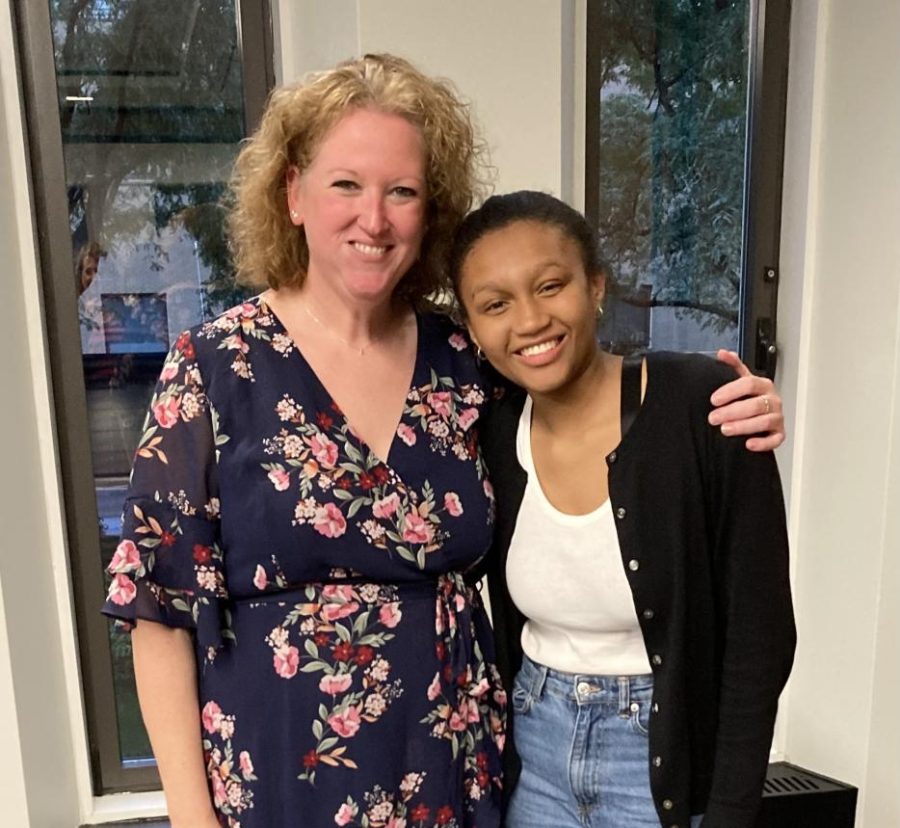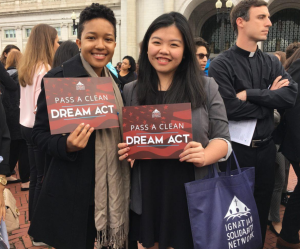NYC’s Housing Crisis Impacts Immigrants: A Common Grounds Conversation
Mary Owens and Jairo Gúzman discussed their work with unhoused populations and encouraged volunteerism
COURTESY OF CAMPUS MINISTRY
Mary Owens with a student leader from Pedro Arrupe Volunteers following the talk on migration and houselessness.
September 29, 2022
Campus Ministry and the Office of Multicultural Affairs hosted this year’s Common Grounds Conversation, an annual event led by Carol Gibney, director of Campus Ministry Solidarity and Leadership, on Sept. 15. The series focuses on the intersection between two critical sociocultural issues, with this year’s discussion titled “The Integration of Migration and Houselessness.”
Mary Owens, Graduate School of Social Service ’10 and director of 30th Street Men’s Intake Shelter, and Jairo Gúzman, president of the Mexican Coalition, were invited to share their perspectives on New York’s housing crisis in relation to the recent increase in immigration.
Both Owens and Gúzman work closely with NYC’s Department of Homeless Services (DHS), which “works to address street homelessness, provide safe temporary shelter, and connect New Yorkers experiencing homelessness to suitable housing,” according to DHS’ mission statement. During the talk, Owens discussed the three sections DHS is divided into: families with children, adult families and single adults. She noted that by creating distinct areas, the system ensures that everyone’s needs are being addressed and that those utilizing the shelters have access to critical services.
According to Owens, the shelters have experienced a drastic influx of clients over the past six months. She said that the number of immigrants arriving at shelters “significantly increased in the last few weeks,” partially due to Texas Gov. Greg Abbott’s migrant busing program, which sends migrants to other cities including New York. On Sept. 12 alone, the 30th Street Men’s Intake Shelter saw 300 clients arrive at its doors, which is 10 times more than the average number.
Gúzman discussed how even though the number of immigrants arriving is increasing, the motivations behind immigration aren’t new.
“Migration continues to be what it was many years ago,” he said. “(They’re) trying to make sure that their families are protected and gain access to health care and quality education.”
Gúzman illuminated the discrepancy between the perverse stigmas surrounding immigration and the reality of lived experiences.
A persisting obstacle for those on the other side of the issue, such as shelter workers and volunteers, is not just funding but bureaucracy, according to Gúzman.
“The truth is that when they come in there, they’re not coming with their hand standing out asking for donations, asking for a handout,” Gúzman emphasized. “They’re asking for an opportunity for them to start taking care of themselves.”
Owens and Gúzman added that, in their experience, one of the most challenging barriers for immigrants once in the country is a lack of information. Gúzman noted that it’s critical for immigrants to have someone “trying to direct and help them navigate the various systems that exist here.”
A persisting obstacle for those on the other side of the issue, such as shelter workers and volunteers, is not just funding but bureaucracy, according to Gúzman. These organizations have to operate within specific parameters, particularly when the resources that they utilize are supplied by government agencies.
Gúzman explained that money left over at the conclusion of the fiscal year cannot be used to purchase supplies that are outside of what the money was initially intended for. He noted that the necessary solution isn’t always more funding and called for the capability to reallocate resources.
“Give us flexibility to deal with some of the stuff that needs to be done immediately. [That way,] if we need to find food for somebody … we don’t have to chase 100 pieces of paper in order for us to be able to serve a family that has immediate need.”
When asked about what meaningful contributions might look like, Owens and Gúzman recommended prioritizing consistency over scale and challenged others to act with purpose and respect.
“Fordham teaches you to think on the macro, and I’m a real micro person,” Owens said.
“I don’t care where you’re from. I care that you’re a person that needs our help” Jairo Gúzman, president of the Mexican Coalition
The two added the need for “human capital” and suggested helping on the phones at shelters. They also recommended pushing nonprofits to improve, and Owens noted that consistent, predictable donations allow for agencies to more accurately prepare for the future by distributing funding through appropriate channels as far ahead of time as possible.
Gúzman concluded the conversation with the mantra that informs his behavior each day.
“I don’t care where you’re from,” he said. “I care that you’re a person that needs our help.”















